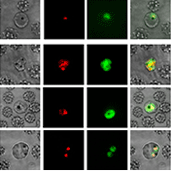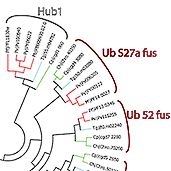Our Research
Our research focuses on developing biological and technological tools to dissect the molecular events driving the human malaria parasite life cycle progression. Using functional genomics approaches, we expect to elucidate critical regulatory networks driving the parasite life cycle and identify novel therapeutic strategies.
Revealing the parasite chromatin structure and its role in transcriptional regulation

Mechanisms controlling gene expression in the parasite are still poorly understood. Rising evidences indicate that control of gene expression in P. falciparum occurs at multiple levels, one of those being chromatin remodeling. It is increasingly apparent that histone turnover and histone post-translational modifications are important in chromatin structure and transcriptional regulation. Determination of chromatin’s structural changes will therefore be critical for the understanding of transcriptional regulation in Plasmodium. Using next generation sequencing technology and histone pull down followed by mass spectrometry analyses; we are investigating the parasite dynamic nucleosome landscapes.
Drug discovery and natural products

In addition to fundamental scientific approaches, we are developing drug-screening assays and high content live cell confocal imaging technologies to identify small molecule inhibitors and their morphological effects on the human malaria parasite. Ongoing collaborations with the Scripps Oceanography Institute (San Diego, CA) and the Georgia Institute of technology are providing us with a comprehensive array of marine extracts. So far we have already uncovered several compounds that can inhibit malaria growth in the low nano molar ranges. Experiments to identify drug targets and drug mechanism of actions are still ongoing.
Understanding the parasite ubiquitination system

One of the fundamental ways in which eukaryotic organisms regulate dynamic cellular processes is by invoking the ubiquitin/proteosome system (UPS). As a central hub for protein turnover and post-translational modification, the UPS is being showcased as an important system for therapeutic intervention in a host of human diseases.Today, the laboratory is undertaking a multi pronged effort to identify components and key mechanisms of the ubiquitination system in malaria. We are employing the power of comparative genomics to discover unique apicomplexan proteins while utilizing advanced genomics and proteomic techniques to analyze the function of parasite specific ubiquitin-ligases. Ultimately, our main goal is to target disease relevant regulatory events in the parasite life cycle.
